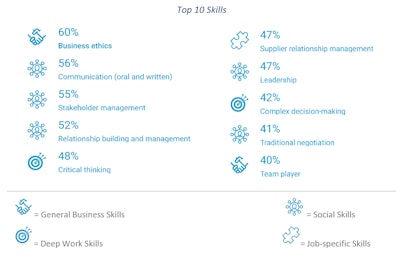
This month’s magic number is 10: Specifically, the 10 skills deemed most important by participants in APQC’s Future Skillsets of Procurement Professionals research. The importance attributed to these skills by procurement professionals from a wide range of organizations and industries points to a future in which procurement is a strategic business partner that drives value: Eight out of 10 skills involve building and navigating relationships with internal or external stakeholders, and social skills dominate the list. While no one can know what the future will bring, individuals who actively invest in building their skills in these key areas will be well-prepared come what may.
1. Business Ethics
Business ethics involve the application of ethical principles in the business environment. It’s no surprise that this skill topped this list, because unethical procurement practices—like bribery, illegal sourcing, or bid rigging—can land organizations in huge trouble with customers, shareholders, and regulatory authorities. But it’s not just about avoiding wrongdoing—business ethics are also critical for achieving corporate sustainability, social welfare goals, and fair treatment for suppliers.
Click here to hear more about ethics in supply chains:
2. Communication
Procurement needs strong oral and written communication skills to understand the needs of the business, clarify expectations with suppliers, and maintain positive relationships with both suppliers and the business. One trend that is taking hold is the use of more collaborative requests—for example, “Request for Solution” and “Request for Partner”—to better align stakeholder and suppliers during the bid process. These collaborative methods are essential when an organization strategically moves to more value-based sourcing business models such as performance-based or Vested agreements.
3. Stakeholder Management
Stakeholder management involves identifying internal and external stakeholders, determining their needs and goals, communicating with them, and positively engaging and influencing them to achieve a desired outcome. A key point to remember is that stakeholder management is not “one size fits all.” The book Strategic Sourcing in the New Economy, for example, emphasizes that the need for stakeholder management increases for more strategic sourcing business models.
4. Relationship Building and Management
Relationship building and management involves consciously creating relationships to manage the business through insight and analytics that drive oversight (rather than micromanagement) across all levels and functions, internally, and with suppliers. Having the interpersonal capability to manage and influence relationships is a skill that individuals need to develop for the future. Contemporary sourcing programs are addressing this need by going beyond stakeholder management and striving to formally incorporate positive relationship building into their sourcing processes.
5. Supplier Relationship Management
Supplier relationship management (SRM) involves establishing governance mechanisms to enable healthy supplier relationships. The University of Tennessee’s pioneering work on SRM outlines a spectrum of supplier relationships, from basic providers at one end to equity partnerships at the other. At the transactional end of the continuum, supplier relationships are mostly focused on defined execution of a task or item within the constraints of the purchase order. Organizations using performance-based or Vested sourcing models, by contrast, will rely on greater collaboration and more sophisticated SRM techniques.
6. Critical Thinking
In the context of procurement, critical thinking means the analysis of facts to determine a course of action. Procurement professionals will need a varied set of skills that include observation, interpretation, reflection, evaluation, problem solving, and decision making to analyze a wealth of facts and figures in order to select the best-fit suppliers. These skills are invaluable not only for new sourcing initiatives but also for the ability to step back and course-correct when things are getting off-track.
7. Leadership
Leadership means guiding, helping, and being a role model for others. Organizations can tap into a number of leadership training courses that provide tools and techniques to sharpen leadership capabilities. NEVI’s Procurement Leadership Program, for example, is focused on leadership and stakeholder management skills. In addition to formal training, best-practice leadership development should also include career roadmaps with cross-functional training, job rotations, and formal mentoring programs with proven leaders.
8. Complex Decision-Making
Complex decision-making is the process of evaluating multiple options to determine the best course of action for situations where there is not one “right answer.” This skill often comes into play when monitoring and managing relationships with suppliers. When things go wrong, procurement professionals need to know when and how to salvage troubled supplier relationships or cut ties, and what the consequences are for both paths.
9. Traditional Negotiation
While negotiation is a skill area in which organizations are not afraid to invest, they will need to re-evaluate their approach to training as they look to the future. The traditional focus has been ensuring that the deal in question is ‘fair,’ but static deals often get out of equilibrium to a point where the deal is no longer perceived as fair by one or both parties. Organizations will increasingly need to negotiate more flexible contracting frameworks – especially for more strategic partnerships.
10. Team Player
Being a team player means showing commitment to the organization, its mission, and colleagues. Team players are reliable, responsible, and flexible. They are transparent about their own limitations, hold themselves accountable, and are willing to take on additional responsibilities or put in a few extra hours when and where needed. Increasingly, being a team player also means showing active forms of cooperation and goodwill toward external colleagues and business partners.
Building a strong foundation for the future of procurement
These ten skills take time to develop and are impossible to fully acquire without practical experience. To build a foundation for future success, procurement newcomers need to observe skilled negotiators, thoughtful decision makers, ethical leaders, and strong relationship builders. They need guidance and mentorship from leaders who care about their future and the future of the profession. Perhaps most of all, they need defined career paths and clear opportunities to hone their skills to ensure a successful future for procurement.













